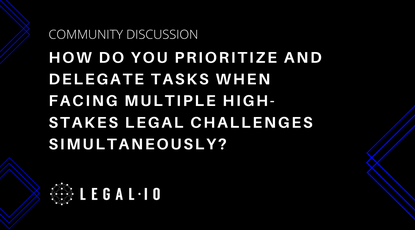One foot in law and one somewhere else
Ok, first things first. Some of you might be wondering, ‘What, exactly, is Legal Operations?’ Well, the term ‘Legal Operations’ – or ‘Legal Ops’ to the initiated – covers the range of activities that supports a business’ in-house legal department (and the term is also starting to be applied within law firms themselves). Legal Operations professionals take care of, for example, strategic planning, technology management, financial matters, and data analytics. In other words, they help lawyers focus on lawyering.
As you can see, Legal Operations professionals have one foot in two worlds. On the one, they are working within legal departments, and on the other, they are bringing a non-legal skill to the table in an effort to optimize their departments’ efficiency, speed, and quality of output.
That means that people can enter the field from either direction. For obvious reasons, many are previous attorneys looking for a more operational, business-related role, or a new challenge. But it’s by no means essential that you’ve been through law school – in fact, people with a fresh perspective who can shake lawyers out of their traditional ways are quite welcome. Those with tech or data science backgrounds, for example, offer skills vital to legal departments’ work, as do those with MBAs. Of course, for those in this situation, some familiarity with the modus operandi of lawyers is still important, as you’ll need to have an understanding of your department’s product.
A good business sense
Lawyers emerge from law school with skulls bulging with cases, statutes, Latin maxims, and legal principles. What their education doesn’t always give them, however, is a head for business. And for too many lawyers, that’s been their undoing – they get so carried away with the razor-sharp legal analysis they’ve trained for that they forget to focus on the workaday aspects of running a commercial outfit.
That's where a Legal Operations professional comes in. You’re there to ensure that not only are lawyers giving good advice, but they’re doing so in a way that actually helps the organization achieve its goals. Whether that’s through improved workflow processes, cost-efficient technology, or performance analytics data, you’ll need to do what you do best with an eye on the business’ bottom line.
An interest in technology
What do the Legal Operations roles we’ve mentioned so far have in common? Well, they (nearly) all involve new technologies. Staying up to date on the latest technology is a crucial part of keeping legal departments ahead of the game. Whether it’s installing a better-functioning case management system or introducing a new time recording software, technologically savvy people are in high demand in legal departments.
Vision
In some senses, the very core of the job of a lawyer hasn’t changed much over the centuries – that is, holding a detailed understanding of the law, and advising clients on how to best achieve their goals in light of it. But the wider legal profession, of course, has changed enormously – thanks to new business models, technology, modern client demands and countless other developments. As a Legal Operations professional, you’ll allow the attorneys to concentrate on their traditional tasks, while you look to the future. You’ll need to anticipate how the market might change, and how your business’ legal department will need to adapt. It’s all part of the excitement of the role!









